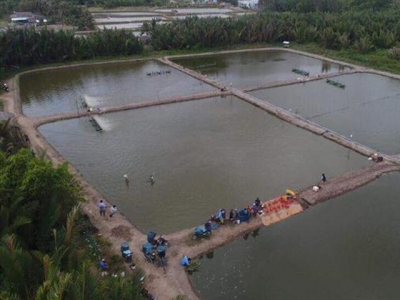Bạc Liêu expands sustainable shrimp farming

BẠC LIÊU – Aquaculture production in the Cửu Long (Mekong) Delta province of Bạc Liêu, particularly high-tech shrimp cultivation, has developed well in recent years because of investments in several kinds of farming models, according to the province’s Department of Agriculture and Rural Development.
Shrimp breeding ponds in Bạc Liêu Province. – VNA/VNS Photo Huỳnh Sử
The province has 13 companies that have invested in high-tech shrimp farming models such as intensive farming under Vietnamese good agricultural practices (VietGAP) standards and super-intensive shrimp farming.
Other models like rotating the breeding of shrimp in the dry season and growing rice in the rainy season on the same rice field, and the breeding of shrimp in mangrove forests, have been efficient and have helped to protect the environment.
The province bred or caught a total of 403,000 tonnes of seafood in the first seven months of the year, including 203,000 tonnes of shrimp, meeting more than its target for the period, according to the province’s People’s Committee.
Bạc Liêu has 131,000ha of aquaculture, including more than 123,000ha of shrimp.
With a coastline of 56 kilometres, the province has brackish and fresh water areas suited for breeding aquatic species.
However, agriculture production still faces the impact of climate change, rising sea levels and disease outbreaks, according to the People’s Committee.
During a meeting with a working group from the Ministry of Agriculture and Rural Development (MARD) in Bạc Liêu on Wednesday (July 29), Vương Phương Nam, deputy chairman of the province’s People’s Committee, said that besides rice, aquaculture has conditions for sustainable development and contributes an important role in socio-economic development.
The province is planning to build a high-quality shrimp fry production centre and aims to become the country’s high-tech shrimp farming hub, according to Nam.
Hoàng Lưu Ly, director of the department, has petitioned MARD to invest in two ship lock combined sluices on the Cà Mau – Bạc Liêu Canal that would take water to breed shrimp south of National Highway No.1A in the dry season.
The province needed MARD’s support in research and transfer techniques for treating waste from shrimp farming under super-intensive, intensive and semi-intensive farming models to reduce pollution on a large scale, he said.
It has asked MARD for funds to invest in infrastructure for areas where the three farming models are being implemented and for an aquatic fry species production area south of National Highway No.1A.
Phùng Đức Tiến, Deputy Minister of MARD, praised the province for preventing disease in aquaculture and developing disease - free shrimp breeding establishments for exports.
He said the province should improve the management of aquatic fry species as well as food, medicine and bio-products used for aquaculture.
It should also raise public awareness among local residents about diseases and strictly punish violators of regulations, he said.
Có thể bạn quan tâm
 Vĩnh Long to develop an eel intensive farm for food safety assurance
Vĩnh Long to develop an eel intensive farm for food safety assurance With an aim to build and develop an eel intensive farm for food safety assurance to provide Vĩnh Long and affiliated provinces
 Cashew nut exports up 1 per cent in H1
Cashew nut exports up 1 per cent in H1 Despite the difficulties posed by the COVID-19 pandemic, Việt Nam’s cashew exports in the first half of the year increased by 16 per cent
 Việt Nam exports nearly 4m tonnes of rice in seven months
Việt Nam exports nearly 4m tonnes of rice in seven months Việt Nam exported 3.9 million tonnes of rice, earning US$1.9 billion, in the first seven months of this year